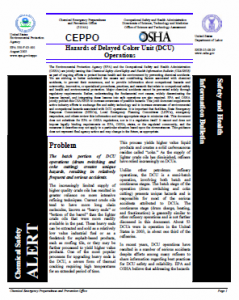Problem: The batch portion of DCU operations (drum switching and coke cutting) creates unique hazards, resulting in relatively frequent and serious accidents.
Read the complete Safety and Health Information Bulletin/Chemical Safety Alert here (PDF)
The increasingly limited supply of higher quality crude oils has resulted in greater reliance on more intensive refining techniques. Current crude oils tend to have more long chain molecules, known as “heavy ends” or “bottom of the barrel” than the lighter crude oils that were more readily available in the past. These heavy ends can be extracted and sold as a relatively low value industrial fuel or as a feedstock for asphalt-based products, such as roofing tile, or they may be further processed to yield higher value products. One of the most popular processes for upgrading heavy ends is the DCU, a severe form of thermal cracking requiring high temperatures for an extended period of time.
This process yields higher value liquid products and creates a solid carbonaceous residue called “coke.” As the supply of lighter crude oils has diminished, refiners have relied increasingly on DCUs. Unlike other petroleum refinery operations, the DCU is a semi-batch operation, involving both batch and continuous stages. The batch stage of the operation (drum switching and coke cutting) presents unique hazards and is responsible for most of the serious accidents attributed to DCUs. The continuous stage (drum charge, heating, and fractionation) is generally similar to other refinery operations and is not further discussed in this document. About 53 DCUs were in operation in the United States in 2003, in about one third of the refineries. In recent years, DCU operations have resulted in a number of serious accidents despite efforts among many refiners to share information regarding best practices for DCU safety and reliability. EPA and OSHA believe that addressing the hazards of DCU operations is necessary given the increasing importance of DCUs in meeting energy demands, the array of hazards associated with DCU operations, and the frequency and severity of serious incidents involving DCUs.








Leave a Reply
You must be logged in to post a comment.